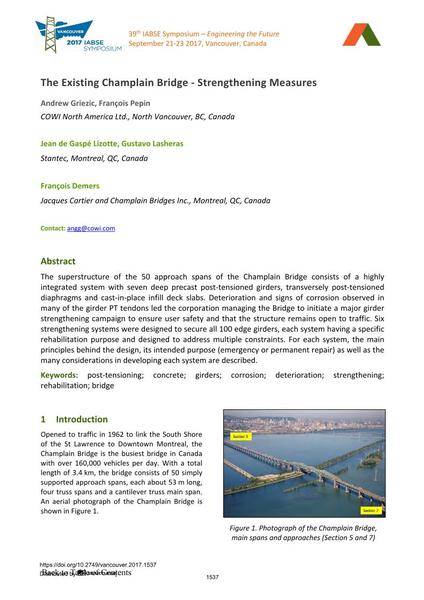The Existing Champlain Bridge - Strengthening Measures

|
|
|||||||||||
Bibliographic Details
| Author(s): |
Andrew Griezic
(COWI North America Ltd., North Vancouver, BC, Canada)
Francois Pepin (COWI North America Ltd., North Vancouver, BC, Canada) Jean de Gaspé Lizotte (Stantec, Montreal, QC, Canada) Gustavo Lasheras (Stantec, Montreal, QC, Canada) Francois Demers (Jacques Cartier and Champlain Bridges Inc., Montreal, QC, Canada) |
||||
|---|---|---|---|---|---|
| Medium: | conference paper | ||||
| Language(s): | English | ||||
| Conference: | IABSE Symposium: Engineering the Future, Vancouver, Canada, 21-23 September 2017 | ||||
| Published in: | IABSE Symposium Vancouver 2017 | ||||
|
|||||
| Page(s): | 1537-1544 | ||||
| Total no. of pages: | 8 | ||||
| Year: | 2017 | ||||
| DOI: | 10.2749/vancouver.2017.1537 | ||||
| Abstract: |
The superstructure of the 50 approach spans of the Champlain Bridge consists of a highly integrated system with seven deep precast post-tensioned girders, transversely post-tensioned diaphragms and cast-in-place infill deck slabs. Deterioration and signs of corrosion observed in many of the girder PT tendons led the corporation managing the Bridge to initiate a major girder strengthening campaign to ensure user safety and that the structure remains open to traffic. Six strengthening systems were designed to secure all 100 edge girders, each system having a specific rehabilitation purpose and designed to address multiple constraints. For each system, the main principles behind the design, its intended purpose (emergency or permanent repair) as well as the many considerations in developing each system are described. |
||||
| Keywords: |
concrete bridge corrosion strengthening rehabilitation post-tensioning deterioration
|
||||
